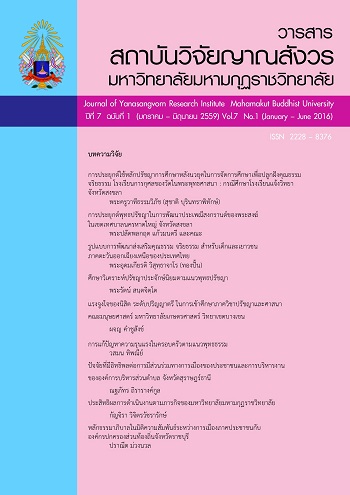AN ANALYTICAL STUDY OF EMPIRICAL PHILOSOPHY ACCORDING TO BUDDHIST PHILOSOPHY
Main Article Content
Abstract
The thesis entitled “An analytical study of Empirical Philosophy according to Buddhist Philosophy” is a qualitative and interview research. The data used for the study are from Theravada Buddhist texts, other concerned documents, and interview the experts in the field concerned. The purposes of the study are 1. to study Empirical Philosophy, 2. to study Empirical Philosophy according to Buddhist Philosophy, 3. to analyze the value of Empirical Philosophy according to Buddhist Philosophy, and 4. to present a new finding and knowledge body on “A model of valuable Empirical Philosophy according to Buddhist Philosophy”. The results of the study found that: The knowledge in Empirical Philosophy comes only from five direct sensational experiences. The real knowledge occurs when the eye, ear, nose, tongue or body has a direct contact with other physical matters. The Empirical Philosophy according to Buddhist Philosophy is also attained by direct experience of oneself with the end of suspect and is expected in practical result. According to Buddhist Philosophy, knowledge is the result from the contact of one of the six sense-organs; eye, ear, nose, tongue or mind and the six sense-objects; form, sound, smell, taste, tangible object and mind-object. Having studied the Empirical Philosophy according to Buddhist Philosophy, one can gain the real knowledge. The new body of knowledge obtained from the study can be concluded in the “FIT” model as follows: 1. F means Fact, material, thing could be touched by eye,ear ect. 2. I means Intellect, wisdom, knowledge and. 3. T means Truth, ultimate truth, absolute truth. Having studied and practiced according to Empirical Philosophy in Buddhist Philosophy, one is certainly believed to attain the real knowledge.
Article Details
References
การศาสนา, กรม. กระทรวงวัฒนธรรม. คู่มือทำวัตรเช้า-เย็น สำหรับพระภิกษุสามเณร. พิมพ์ครั้งที่ 3. กรุงเทพมหานคร : โรงพิมพ์ชุมนุมสหกรณ์การเกษตร, 2550.
กีรติ บุญเจือ, แก่นปรัชญา. กรุงเทพมหานคร : ไทยวัฒนาพานิช, 2522.
เคนศักดิ์ ตันสิงห์, ผศ. ปรัชญาเบื้องต้น. กรุงเทพมหานคร : พิมพ์ที่ SR Printing, 2537.
ชัยวัฒน์ อัตพัฒน์, รศ. ญาณวิทยา. นครปฐม : สาละพิมพการ, 2555.
ทักษิณคณาธิกร, พระ. ปรัชญา. กรุงเทพมหานคร : พิมพ์ที่ โรงพิมพ์ บริษัทสหธรรมิก จำกัด, 2544.
เทพเวที (ประยุทธ์ ปยุตฺโต),พระ. พจนานุกรมพุทธศาสน์ ฉบับประมวลศัพท์. กรุงเทพมหานคร : มหาจุฬาลงกรณราชวิทยาลัย, 2533.
ทองหล่อ วงษ์ธรรมา, รศ.,ดร. ปรัชญาทั่วไป. กรุงเทพมหานคร : พิมพ์ที่ โอ. เอส. พริ้นติ้ง เฮ้าส์, 2549.
ธนิต อยู่โพธิ์. วิปัสสนานิยม. พิมพ์ครั้งที่ 7. กรุงเทพมหานคร : โรงพิมพ์ มหาจุฬาลงกรณราชวิทยาลัย, 2540.
ธรรมกิตติวงศ์ (ทองดี สุรเตโช), พระ. คำวัด. กรุงเทพมหานคร : พิมพ์ที่ โรงพิมพ์เลี่ยงเซียง, 2548.
ธรรมปิฎก (ป.อ. ปยุตฺโต), พระ. พุทธธรรม. พิมพ์ครั้งที่ 8. กรุงเทพมหานคร : โรงพิมพ์มหาจุฬาลงกรณราชวิทยาลัย, 2542.
______.พจนานุกรมพุทธศาสตร์ ฉบับประมวลธรรม. พิมพ์ครั้งที่ 9.กรุงเทพมหานคร : โรงพิมพ์มหาจุฬาลงกรณราชวิทยาลัย, 2543.


